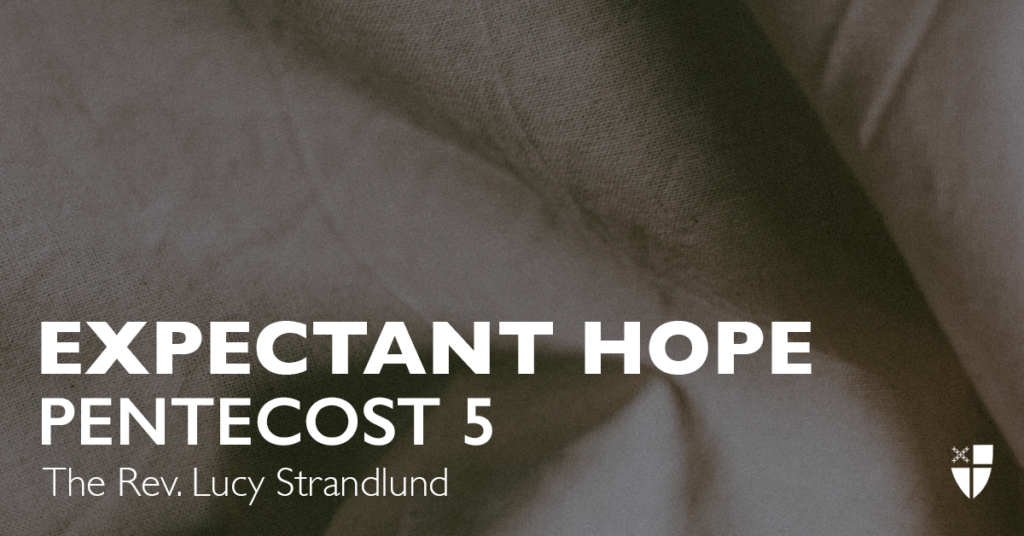Expectant Hope, Proper 8 (B) – 2021
June 27, 2021
RCL: 2 Samuel 1:1, 17-27; Psalm 130; 2 Corinthians 8:7-15; Mark 5:21-43

In today’s Gospel, we hear two stories of healing. They are also stories of hope—a bold, persistent, expectant hope.
First, we are introduced to Jairus, a leader of the synagogue, who emerges from the crowd that meets Jesus as he disembarks from a boat. Jairus approaches Jesus, falls before him, and begs him to heal his little daughter. While a large crowd follows Jesus and presses in on every side, he begins to accompany Jairus to his home.
Soon, another person emerges from the crowd. She is not there to ask for the healing of another but rather to seek it for herself. There is no one there to advocate for her. No friends to carry her on a mat or lower her through the roof to be seen by Jesus.
She has tried everything. She has done everything money can buy. She has seen countless doctors and has only grown worse. But something in her still hopes. Despite all she has been through, something in her believes, trusts, even expects that if she simply reaches out and touches the edge of Jesus’ cloak, she will be healed.
She does not approach Jesus with the intention of falling before him or even of speaking to him. Perhaps she doesn’t want to bother or inconvenience him. All she wants is to simply touch his cloak and then maybe slip away, unnoticed yet healed. She comes up behind him and reaches for his hem. She immediately feels healing within her. She might have escaped through the crowd, except that Jesus feels the exchange as well. He begins to look around the densely packed crowd, asking, “Who touched me?” The disciples are befuddled and Jairus is likely impatient, but Jesus is insistent.
Whether out of self-consciousness or out of sheer awe at what has happened to her, the woman steps forward and shares her story with Jesus and in front of the crowd. Jesus responds, “Daughter, your faith has made you well; go in peace, and be healed of your disease.”
What relief she must have felt, not only to be healed physically but to be seen and encouraged by Jesus. There had been no one to ask for healing for her. She felt she had to acquire her healing by making as little commotion as possible. By stopping and inviting her to tell her story, Jesus encourages the woman to see that not only is she worthy of healing but also that she offers the crowd a witness of deep faith, persistence, and courage. And with his words, Jesus himself becomes her advocate.
After Jesus sends her on to live healed and at peace, he goes to heal another daughter. He and Jairus are soon on their way again, despite other people saying that hope for the daughter’s life is already lost. Jesus enters the home, gathers with the young girl’s parents and loved ones, and invites her to get up and walk around. She is healed, and they are all overcome with amazement.
Both of these stories contain amazing healing but also persistent hope. The woman has exhausted everything she has—her finances, her options—but hope emboldens her to reach out her hand, even when her body and her finances are depleted.
Jairus is told not to bother the teacher any longer, that his daughter has already died. But he and Jesus carry on, continuing to the house to see her. Hope moves his feet, carries him forward.
There is desperation and depletion in both of these stories, yes, but hope is stronger. Hope asks for healing and persists. And it is clear in both stories that to hope is to know something about who Jesus is. In their different ways, both Jairus and the woman reach out to Jesus in hope because they know who he is. To hope is to rest in the assurance that Jesus desires healing, wholeness, and fullness of life for all of God’s children.
Healing—physical, emotional, societal—takes place in many different ways. To seek healing is to hope for more wholeness, to believe that it is possible. In Christ, we believe such wholeness is not only possible but also desired by the One who created us and loves us.
After a year of pandemic, heated political divides, isolation, and unrest, we are hungry for healing within our bodies, our tired souls, and our communities. To follow Christ is to know and to be encouraged that God desires this healing. God desires fullness of life, peace, and wholeness.
So how do we need to reach out for this healing? What stories do we need to tell? Do we need to ask for help, for rest, for prayer, for companionship, for an advocate? For what and where do you desire healing, and how might you seek it?
To ask for and seek healing is an act of hope and a witness to the love of God. It is to be rooted in the knowledge that God loves us and desires wholeness for us and for our communities.
Today you may identify with Jairus and feel moved with compassion to advocate for the healing of another, knowing that we cannot accomplish another’s healing for them, but we can use our voices for good. Or you may identify with the woman, depleted yet determined to take the next step in faith.
Either way, may we seek healing where it is needed and remember that to believe in Jesus is to hope for—even to expect—healing and wholeness. Amen.
¡No olvide suscribirse al podcast Sermons That Work para escuchar este sermón y más en su aplicación de podcasting favorita! Las grabaciones se publican el jueves antes de cada fecha litúrgica.


